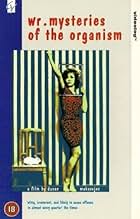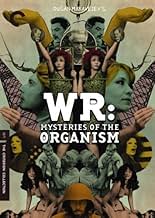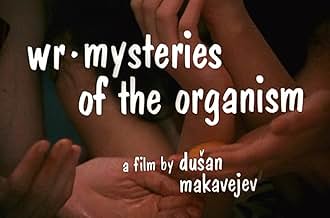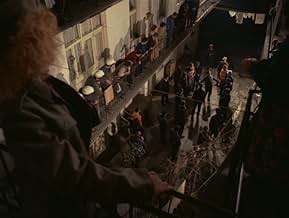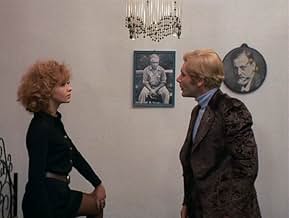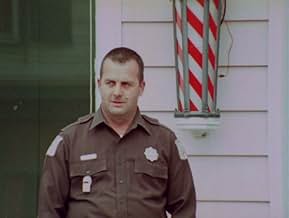IMDb रेटिंग
6.6/10
5.7 हज़ार
आपकी रेटिंग
अपनी भाषा में प्लॉट जोड़ेंAn homage to the work of psychologist Wilhelm Reich, matched with a story about a Yugoslavian girl's affair with a Russian skater.An homage to the work of psychologist Wilhelm Reich, matched with a story about a Yugoslavian girl's affair with a Russian skater.An homage to the work of psychologist Wilhelm Reich, matched with a story about a Yugoslavian girl's affair with a Russian skater.
- पुरस्कार
- कुल 3 जीत
Mikheil Gelovani
- Joseph Stalin
- (आर्काइव फ़ूटेज)
Zedong Mao
- Self
- (आर्काइव फ़ूटेज)
- (as Mao Zedong)
Wilhelm Reich
- Self
- (आर्काइव फ़ूटेज)
David Henry Bradley Jr.
- Self
- (बिना क्रेडिट के)
फ़ीचर्ड समीक्षाएं
The film for which director Dusan Makavejev is best known. It's similar to his later Sweet Movie, which I watched last week, in that it's made up of a bunch of disparate parts edited together. The most prominent thread is a documentary about sexual psychiatrist and (pseudo-)scientist Wilhelm Reich, a refugee from Nazi Germany who fled to the United States, where he was ironically persecuted and imprisoned when the government became suspicious of his work. A second thread is fictional, set in Eastern Europe, and is about a sexually liberated woman (Milena Dravic) promoting sexual freedom in Communistic language. There are other smaller threads about Andy Warhol's transsexual protégé Jackie Curtis, a hippie with a gun who runs around New York City, a woman who makes dildos and probably a couple of other ones I'm not remembering. The film covers some interesting areas, but it's too loose and not interested enough in any of these things to engage in them. The separate bits began to fall apart, for me at least. Sweet Movie was kind of a mess, but it was a well-structured masterpiece in comparison to WR. I liked Sweet Movie a whole lot more.
Directed by Serbian filmmaker Dusan Makavejev (also known for directing 'Sweet Movie', and the Australian produced 'The Coca-cola Kid'), the film mixes documentary and narrative cinema, to comment on the infiltration of Soviet Communism, sexual politics/sexual revolution, in a political satire. The main drive of the film to begin with is the work of Austrian-American psychiatrist and psychoanalyst, Dr Wilhelm Reich: His theories of Organon therapy (use of static electricity), and the connection between neuroses in people that is rooted in physical, sexual and social surroundings. This connects also with the work of Alexander Lowen, an American psychotherapist (and student of Reich's), who practices and teaches Bioenergetic analysis which uses therapeutic body work to associate the mind with the body, and in theory release repressed energy through the body sexually without the act of physical sex. I observed in these sequences a kind of connection to the work of Arthur Janov, and his primal scream therapy.
The narrative section of the film tells the story of Milena (Milena Dravic) and her sexually promiscuous flatmate Jagoda (Jagoda Kaloper), and their theories and speeches of sexual revolution: "The October revolution was ruined when socialism rejected free love". They meet a Russian communist figure skater, Ivica (Vladimir Ilivich), who they seduce. But Milena soon discovers that communism has no time for sexuality unless it is first met with physical violence. This seems to be a metaphor for the struggle against Stalinist communism within Yugoslavia since the second world war. But in the film Ivica seems somewhat deluded by the concept of communism (as he states, "communism is a Latin word meaning communal), whilst almost being made rigid by the sexual intentions of Milena.
The most interesting part of the film is the first part that focuses on the life and work of Wilhem Reich (hence the W. R. in the films title). He first started working in psychoanalysis with Sigmund Freud in the 1920's, but after writing books such as 'The Mass Psychology of Fascism', fled Austria for America, where he settled in Maine. He worked on his theories of orgone therapy, and developed the orgone accumulator, an organic box lined with lead that individuals would sit in and is theorised as giving both therapy to the bodies organs and to sexuality (The use of the orgone accumulator was even endorsed by William S. Burroughs.). Eventually Reich was arrested (more than likely the victim of situation - i.e. he was from behind the iron curtain), and viewed as insane - despite being tried in court. All of his books were burned in New York, supervised by the federal food and drugs administration agents (take from that what you will).
It is an interesting film. The different strands are connected by the theories of Wilhelm Reich. But it's one of those films that is probably more interesting to talk about than watch as it is incredibly slow moving, and at times seems to focus on activities (such as bioenergetic analysis), as group fad, and seems to almost fall into a 'new age' enlightenment message. Released in 1971, this would make sense, as the sexual revolution was in full 'swing'. Despite all of this it is a relatively enjoyable piece of cinema, with some nice ideas in it. But again, the life of W R far outshines the film as a whole.
www.the-wrath-of-blog.blogspot.com
The narrative section of the film tells the story of Milena (Milena Dravic) and her sexually promiscuous flatmate Jagoda (Jagoda Kaloper), and their theories and speeches of sexual revolution: "The October revolution was ruined when socialism rejected free love". They meet a Russian communist figure skater, Ivica (Vladimir Ilivich), who they seduce. But Milena soon discovers that communism has no time for sexuality unless it is first met with physical violence. This seems to be a metaphor for the struggle against Stalinist communism within Yugoslavia since the second world war. But in the film Ivica seems somewhat deluded by the concept of communism (as he states, "communism is a Latin word meaning communal), whilst almost being made rigid by the sexual intentions of Milena.
The most interesting part of the film is the first part that focuses on the life and work of Wilhem Reich (hence the W. R. in the films title). He first started working in psychoanalysis with Sigmund Freud in the 1920's, but after writing books such as 'The Mass Psychology of Fascism', fled Austria for America, where he settled in Maine. He worked on his theories of orgone therapy, and developed the orgone accumulator, an organic box lined with lead that individuals would sit in and is theorised as giving both therapy to the bodies organs and to sexuality (The use of the orgone accumulator was even endorsed by William S. Burroughs.). Eventually Reich was arrested (more than likely the victim of situation - i.e. he was from behind the iron curtain), and viewed as insane - despite being tried in court. All of his books were burned in New York, supervised by the federal food and drugs administration agents (take from that what you will).
It is an interesting film. The different strands are connected by the theories of Wilhelm Reich. But it's one of those films that is probably more interesting to talk about than watch as it is incredibly slow moving, and at times seems to focus on activities (such as bioenergetic analysis), as group fad, and seems to almost fall into a 'new age' enlightenment message. Released in 1971, this would make sense, as the sexual revolution was in full 'swing'. Despite all of this it is a relatively enjoyable piece of cinema, with some nice ideas in it. But again, the life of W R far outshines the film as a whole.
www.the-wrath-of-blog.blogspot.com
I completely disagree with the comments of the previous reviewer. Personally knowing very little about the Orgone or Wilhelm Reich, I derived great enjoyment from this film. In fact, I popped in on the TV just to get an idea of its style and structure (without planning to watch it right then) and ended up getting sucked in and watched it all the way through. Makavejev's filmmaking (that I've seen) is quite different from the norm, but not in an overly self-conscious or self-serving way, like Hal Hartley's efforts. "WR" is egoless, simply using film to draw parallels and make observations that are done quite effectively in Makavejev's unique style. It reminded me of the "I am Curious" films, but those are also a bit too self-conscious for me. I also highly recommend Sweet Movie, a later film of his. I only wanted to post these comments in light of the previous user's comments, as we should all remain aware of how subjective one's tastes are from another's. I didn't like the previous user making such blanket statements like "I suppose it might be watchable enough for people who are familiar with Reich, but if you aren't, then I strongly urge you to avoid this film at all costs." when tastes are obviously so variant - remember, I knew barely anything about WR or the Orgone, and enjoyed the film tremendously. Thanks for your time.
10NateManD
WR: Mysteries of the Organism, is one unique if not messed up viewing experience. Part documentary and part fictional surrealist philosophical sex comedy, Serbo-Croatian director Dusan Makavejev assaults the viewers senses with imagery, music, politics and satire. "Mysteries of the Organism" is on many top 1000 film lists, but for some odd reason it is nearly impossible to track down. Just like Makavejev's other film "Sweet Movie", I was put on a several month waiting list on Amazon. Thank god for ebay! This is a film that screams for a DVD release, but I don't think many distributors want to touch it due to it's explicit sexuality and subversive elements. The film starts off as a documentary on Wilhelm Reich, a scientist who studied the orgon and used the human orgasm as a method for healing. Of course, similar to the scientist Tesla; his books were seized and burned by the U.S. government and FDA. Then the second part of the film deals with Milena, a sexually liberated Yugoslavian girl who makes revolutionary speeches on her apartment balcony. She says "The October Revolution failed by not excepting free love". Later she falls in love with a Soviet figure skater who's afraid to express his sexual feelings. So this film is a comedy, based on the politics of human sexuality. It mocks capitalism and communism for suppressing people's sexual desires. Now if only I could find the soundtrack. My rating is 10/10, which means I'll watch it again!
WR is one of my two favorite films, and is widely considered by people knowledgable about the film and the era as "one of the most profound and humerous films of the decade". I call it the "Citizen Kane of the Sixties" because it did what the first "Citizen Kane" did earlier - it summarized the realities we all were living with in the Sixites in the Global Village - the reality of sexual repression in both the East and West, the horrors of the McCarthy Era in this country, the obsession with sports in Russia, etc., etc. It is no accident that a still from this film is on the cover of one of the greatest books on film, "Film As a Subversive Art" by film critic and founder of the NY Film Festival, Amos Vogel. I can understand why many Americans do NOT understand this film - the organization of the film, the two overlapping storylines, the music - all so different from the Hollywood material. However, it is considered by many including myself to be a masterpiece, as are all the films by its director, Dusan Makavejev. Together, he and Jean-Luc Godard are the two "Picassos" of film since WW II - and should both be held as two of the greatest filmmakers of all time.
क्या आपको पता है
- ट्रिवियाBanned in Yugoslavia immediately after release.
- भाव
Narrator: Comrade lovers, for your health's sake, fuck freely!
- इसके अलावा अन्य वर्जनAlthough this film was passed uncut for UK cinemas upon its original release, the 1995 Connoisseur Video release used an edited print which was shown on Channel 4 as part of a 1991 censorship season. This TV version used psychedelic computer generated masking techniques to hide some of the more explicit details, including genuine sex during the opening Soviet sex education film, the images on the wall paintings showing people masturbating, and all shots of Jim Buckley's penis as a plaster cast is made of it (which was obscured by digitally animated stars).
टॉप पसंद
रेटिंग देने के लिए साइन-इन करें और वैयक्तिकृत सुझावों के लिए वॉचलिस्ट करें
- How long is WR: Mysteries of the Organism?Alexa द्वारा संचालित
विवरण
- रिलीज़ की तारीख़
- कंट्री ऑफ़ ओरिजिन
- भाषाएं
- इस रूप में भी जाना जाता है
- WR: Mysteries of the Organism
- फ़िल्माने की जगहें
- Rangeley, मेन, यूएसए(Wilhelm Reich Museum/commune and town scenes)
- उत्पादन कंपनियां
- IMDbPro पर और कंपनी क्रेडिट देखें
- चलने की अवधि1 घंटा 24 मिनट
- रंग
- ध्वनि मिश्रण
- पक्ष अनुपात
- 1.37 : 1
इस पेज में योगदान दें
किसी बदलाव का सुझाव दें या अनुपलब्ध कॉन्टेंट जोड़ें


